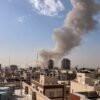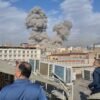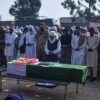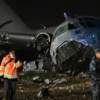Pope Francis died of a stroke on Monday at the Vatican aged 88. His funeral is to be held later this week in the presence of worshippers and dignitaries before a conclave of cardinals is convened to elect a successor.
Here’s what we know about the circumstances surrounding Jorge Bergoglio’s death and what is to follow.
– Fatal stroke –
Pope Francis was admitted to a Rome hospital on February 14 with bronchitis, which later turned into double pneumonia that almost killed him twice.
He left hospital on March 23 and was due to undergo a strict two-month convalescence period.
But the Argentine made a series of impromptu public appearances, looking increasingly weak. The Vatican announced his death early Monday morning.
Francis died of “cerebral stroke, coma, irreversible cardiocirculatory collapse”, according to a death certificate released by the Vatican.
– Lie in state –
His body was laid to rest in a coffin in the chapel of the Santa Marta residence on Monday evening. It is expected to be transferred to St. Peter’s Basilica starting Wednesday to lie in state.
– Funeral –
There is no set date for a funeral yet, but it must take place between the fourth and sixth days after the pope’s passing — so between Friday and Sunday.
A first gathering of cardinals is expected to decide exactly when on Tuesday.
The funeral mass will be held in St Peter’s Basilica in the Vatican, where Francis’s immediate predecessors were buried. But he asked to be buried in the basilica of Santa Maria Maggiore in Rome.
World leaders and faithful from all over the world are expected to flock to the city to attend the ceremony and pay their respects to the leader of the world’s 1.4 billion Catholics.
US President Donald Trump was the first to announce his attendance.
– Conclave –
The starting date of the conclave, during which 135 so-called “cardinal electors” will choose Francis’s successor, is not yet known either.
But it should begin no less than 15 and no more than 20 days after the death of the pope.
The cardinals will meet in the Sistine Chapel, a Renaissance jewel adorned with Michelangelo’s celebrated frescoes, and hold four ballots a day, two in the morning and two in the afternoon, until one candidate wins two-thirds of the votes.
At the end of each session, the ballots are burned in a stove by the chapel, releasing smoke above the Apostolic Palace as the world watches.
If black smoke billows from a chimney overlooking St Peter’s Square, the vote has been unsuccessful. White smoke signals a new pope has been elected.





